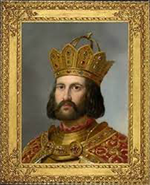Otto IV: King of Germany, Holy Roman Emperor
Otto IV was King of Germany and Holy Roman Emperor in the late 12th Century and early 13th Century. 
He was born in 1175. His father was Henry the Lion, and his mother was Matilda of England. Thus, Otto was the grandson of King Henry II of England and Eleanor of Aquitaine and, in fact, grew up at Henry's court, becoming the foster son of his uncle, Richard I. Otto served as Earl of York when Richard went off on Crusade, and Richard later sought to marry Otto to Margaret of Scotland, whose father was King William the Lion. Richard gave Otto the County of Poitou to rule, and Otto fought with Richard against King Philip II of France. When Emperor and German King Henry VI died in 1198, a majority of German nobles selected Henry's brother, Philip of Swabia, as their next king. A significant number of nobles, however, did not want Henry to be followed by his brother and so signaled their support for Otto, the elder representative of the House of Welf (since his brother was away on Crusade). Otto also had the support of Pope Innocent III. Otto and Philip both claimed the German kingship; and indeed, both were crowned King of Germany in 1198 –Otto on July 12 and Philip on September 8. The pope it was who crowned Otto, in Aachen, and so Otto believed that his kingship was legitimate. Otto also had the support of English kings Richard I and then John. John's subsequent defeats at the hands of France meant that Otto couldn't much count on English help. Otto and Philip collected endorsements and supporters but rarely came to blows, one exception being a victory by Philip's forces at Wassenberg in 1206. Otto was wounded in that battle. That victory gave Philip control over most of Germany, but he still did not have the pope's blessing. Innocent III called both leaders to Cologne for a negotiation, at which Philip offered his oldest daughter, Beatrice, as a wife to Otto and also offered him the Duchy of Swabia; the condition was that Otto give up his claim to the throne–he refused. On June 21, 1208, Philip attended the wedding of his niece, Beatrice II of Burgundy, to Duke Otto of Merania. Later that same day, Philip died, the victim of an assassin, later identified as Otto VIII, Count Palatine of Bavaria. Historians still debate the motive for the killing but generally find no connection with Philip's rival Otto, who no doubt benefited from the sudden death of his antagonist. Otto then married Beatrice and gained the support of enough nobles to see his claim to the German throne legitimized. No further dissent materialized, and Otto achieved his ultimate goal, being crowned Holy Roman Emperor on Oct. 21, 1209. Otto and Innocent III had come to an understanding about what would happen after Otto was crowned. The emperor had agreed to give back some powers to the Church and to send to the papacy any revenues from seats of bishops not appointed. Not long after leaving Rome, Otto went back on his word and again sought to bolster imperial power. Otto boldly marched on Rome, occupied it, and commanded Innocent III to renounce the Concordat of Worms, to which Henry V had agreed nearly a century earlier. The pope refused and, further, excommunicated Otto. Frustrated but unrepentant, the emperor marched on, intending to conquer Sicily. He was ultimately unsuccessful but largely because, after hearing that many of his nobles had revolted, he returned to Germany. What he found was a different landscape. Henry VI's son Frederick, only 2 when his father died, was all grown up now and was the choice of the Diet of Nuremberg in 1211 to take over as King of the Romans. Otto found that he had relatively few friends and allies left. Innocent III had blessed Frederick as the new king, as had France's Philip II. The French monarch's involvement brought the English monarch, by this time John, into the fray. The two sides fought a large pitched battle on July 27, 1214, near the Bridge of Bouvines. Although Otto and John between them had 10,000 more troops than the French, they lost the battle when Otto's horse bolted from the field and his troops followed suit. The following year, Frederick pressed his advantage, taking Aachen and Cologne. Frederick had enough power in 1215 to depose Otto, and the onetime emperor fought no more. Three years later, he was dead, the victim of a disease. His wife, Beatrice, had died just three weeks after she and Otto had married. He had waited a few years and then married again, to Maria of Brabant. Neither marriage produced children. |
|
Social Studies for Kids
copyright 2002–2026
David White




